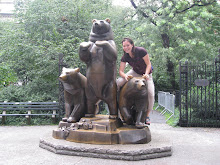On Christine Hine's Virtual Ethnography -
This was a good starting point for me to read. I knew that we were attempting to create an 'ethnography', but I had not thought to critically analyze how ethnographies were collated previously. I feel like this chapter of Ms. Hine's book was written in a similar vein as Prof. Wesch's Web 2.0 video. He said that we would have to rethink a lot of things, and that is essentially what Ms. Hine is saying in reference to ethographic work. The internet is a completely new form of media that allows more static forms of text to exist as well as more fluid text (chat rooms, message boards, etc.), videos, and file sharing. New communities are formed based on shared interest and are in no way, shape, or form bound or constrained by geographic location. Language is not even a barrier overly much because of instant translators that can be installed as "plug-in"s. Ms. Hine's examples are a bit dated (her book was published in 2000 - before the advent of YouTube, for example), but still remain true.
For our project, it made me think of how exactly are we to go about this. For my project, I find it entirely too easy to see myself falling into the role of an "armchair anthropologist" and perhaps not thoroughly embracing/participating/observing anonymity on the internet. But perhaps I already am by being a "lurker". It makes me wonder how we are going to be able to get "informants", or if we should mostly throw that idea away and rely on message-boards and publicly posted interactions amongst anonymous people on the internet - or should we try to become our own informants? A lot of the questions that I though of while reading this chapter were the same, or at least similar, questions that I had when we completed the IRB training. It's one of those conundrums where we have to figure out not only what applies to us, but how or even if we should attempt to follow the semi-standardized form of ethnographic research? Ms. Hines final 10 points touch on this, but I think #10 is the most relevant - we are doing a "virtual" ethnography (meaning a pseudo, not-real-world, or some other definition type of ethnography). interesting points...
Yochai Benkler The wealth of networks
Definitely sensing a theme here. This article, I believe, is defending the internet as merely a medium. It is not a community/social destroyer or creator. It is what it is and a lot of the negative reactions to its use are similar to the ones raised every time in the last hundred plus years when new connective media has been introduced. The printing press, telegrams, morse code, telephones, television, and now the many forms of the internet are met with fear because they do/have destroyed society as it was known. To quote R.E.M., "it's the end of the world as we know it" and then to quote the TV show Life, "it's like living in the future". Each new technology has quite literally changed the world, how people organize, and how communication and communities are created. Benkler seems to be pointing out that there may be negative aspects, but his overall argument is that the internet is majority positive. I think that it's too early and too simple to call it one thing or the other. It simply is.
With regard to our research, the Anonymous group and anonymity seems to feed into the 'anomie', social deconstruction argument presented in Benkler's chapter 10. At least, it does at first. Yet as Howard Rheingold points out, even those without names or explicit identities seeked to form a community on the internet. They do things for the lulz, they lurk, they protest; the Anons are part civic activist and part bullying thrill-seeker anarchist. It's fun because, as Hine pointed out, it is a virtual reality with different rules, different social mores, and a different society. I think what Benkler did not point out is that the internet is not merely an extension of a community's day-to-day life; the internet forms its own reality with different "ethnic groups", communities, religious ideas, social mores, ideas of justice, humor, language... everything.
Subscribe to:
Post Comments (Atom)

No comments:
Post a Comment